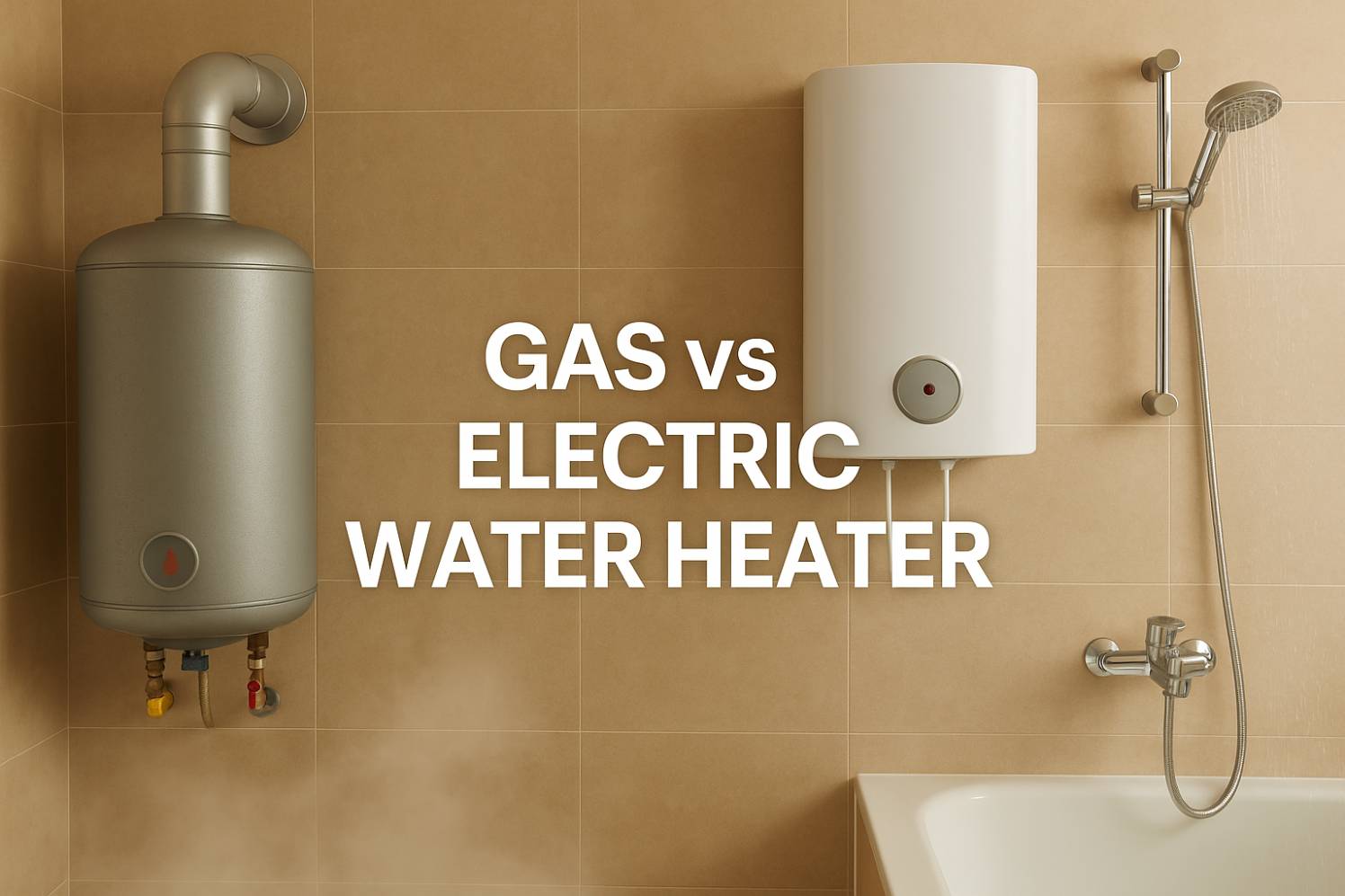When I first moved into my new home, I didn’t think much about my water heater—until I took a freezing shower one morning. That’s when the big question hit me: gas vs electric water heater—which one’s actually better?
Like most homeowners, I wanted something reliable, energy-efficient, and not a total drain on my wallet. I’ve spent time using both types (and even flirted with tankless and hybrid models), so consider this my firsthand, slightly nerdy, but totally practical guide to figuring out what fits your lifestyle best.
What’s the Real Difference Between Gas and Electric Water Heaters?
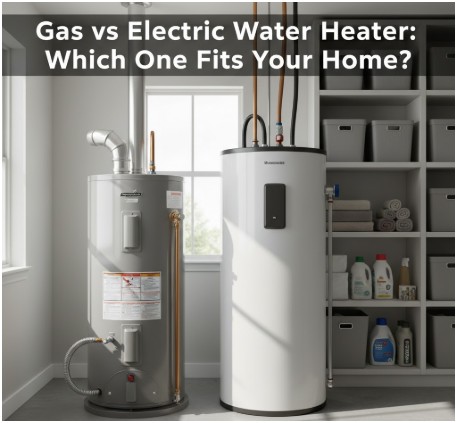
At their core, both heat your water—but the energy source makes all the difference. Gas models use natural gas or LPG, while electric ones rely on electricity. That one detail affects everything—from how quickly you get hot water to how much you’ll pay monthly.
If you already have a gas line, a gas water heater might make more sense. But if your home is all-electric, you’ll appreciate the simplicity of installation and safety that electric models offer.
I’ve noticed that gas units heat water faster and can handle back-to-back showers easily. Electric units, on the other hand, take a little longer but make up for it with efficiency and fewer maintenance headaches.
Which One Costs Less to Run Over Time?
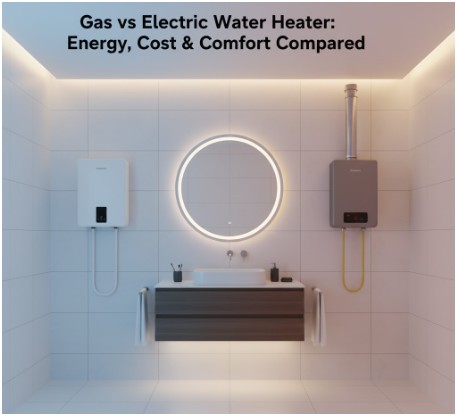
Here’s where things get interesting. The upfront cost and long-term cost can tell two very different stories.
| Feature | Gas Water Heater | Electric Water Heater |
| Initial Cost | Slightly higher | Lower |
| Installation | Needs gas line + venting | Easier, cheaper install |
| Monthly Energy Cost | Lower (gas is cheaper per BTU) | Higher unless hybrid model |
| Maintenance | Annual inspection needed | Minimal upkeep |
Gas heaters often have higher installation costs because of venting and safety requirements. However, their operating costs are typically lower because gas is cheaper than electricity in many areas. Electric models are budget-friendly to install and maintain but may cost a little more monthly depending on your utility rates.
If your priority is long-term savings, a hybrid (heat pump) electric heater might steal the show—it uses ambient air to heat water, cutting energy use drastically.
Which Heats Faster — and Can Handle Family Rush Hour?
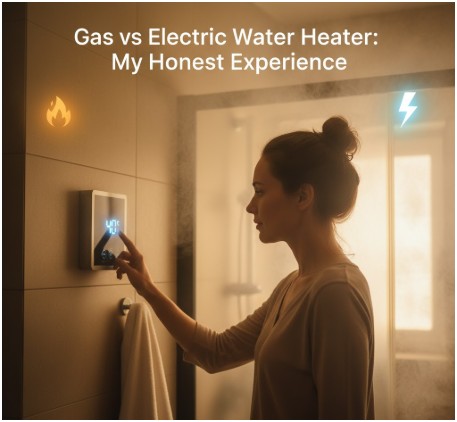
Having lived in a household of five, I learned quickly that speed matters when you’re the last one in line for a hot shower.
Gas water heaters are faster, period. They have a high recovery rate, meaning they can heat more gallons per hour. Electric ones are slower to recover, which can be annoying when everyone’s trying to get ready in the morning.
If you have a large family or use lots of hot water (think showers, laundry, and dishwashing all at once), a gas heater or tankless water heater might be your savior.
Electric models, though slower, are great for smaller households or people who prefer consistency over speed.
What About Tankless and Hybrid Water Heaters?
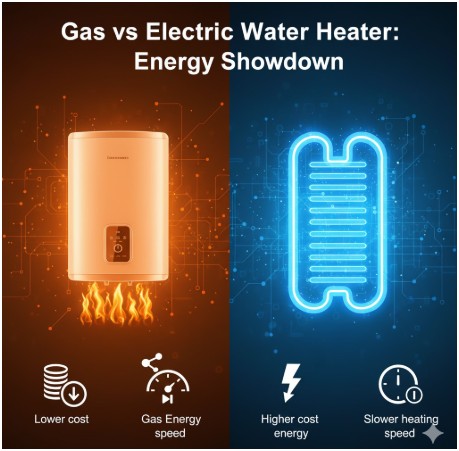
Over time, I’ve experimented with both tankless and hybrid (heat pump) water heaters, and I’ll say this—they’re total game-changers when used right.
Tankless Water Heaters
Also known as “on-demand” systems, they heat water as it flows—no storage tank, no waiting. That means endless hot showers and no running out mid-rinse.
They do cost more upfront, but they save energy since they don’t constantly keep water hot.
For example, the Crompton Rapid Jet 3-L Instant Water Heater (electric) is compact and sleek, while the Havells Flagro 5.5 L Gas Geyser delivers instant heating with safety controls.
Hybrid Water Heaters
Hybrid or heat pump models are the most energy-efficient electric options available today. They pull heat from the surrounding air and transfer it into the water. It’s like magic, only quieter.
They’re ideal for homeowners who want to reduce their carbon footprint and save on electricity long-term. The only downside? They need more installation space and cost more initially—but they pay for themselves over time.
How Do I Choose Between Gas and Electric Water Heaters?
I always tell friends to think about these five factors before making the leap:
- Fuel Availability: If you already have a gas line, gas models are worth considering. If not, the extra installation costs might not be worth it.
- Upfront vs. Long-Term Cost: Electric models are cheaper upfront, but gas often wins in the long run depending on your energy rates.
- Household Size: Big family? Go gas or tankless. Small household? Electric or hybrid is fine.
- Space Constraints: Electric and gas tankless models work wonders in small homes or apartments.
- Environmental Impact: If sustainability matters to you, go electric or hybrid—especially if your electricity comes from renewable energy sources.
How to Maintain Your Water Heater for Longer Life
I’ve learned the hard way that neglecting your water heater can cost you dearly. A few habits can keep yours in top shape:
- Flush the tank once a year to prevent sediment buildup (for tank-type heaters).
- Inspect the anode rod every two years—it prevents internal rust.
- Check vents and wiring for damage or leaks annually.
- Clean filters if you’re using a tankless system.
Maintenance for electric units is generally easier, while gas units need annual inspection to ensure proper combustion and safety.
FAQs About Gas vs Electric Water Heater
Q1: Which is safer—gas or electric water heater?
Electric models are generally safer because there’s no risk of gas leaks or carbon monoxide exposure. Gas heaters are safe too when installed and maintained correctly, but they do need proper ventilation.
Q2: Can I use a gas water heater without electricity?
Some gas water heaters with standing pilot lights can still operate during power outages. However, modern tankless and power-vented gas heaters rely on electricity for ignition and controls.
Q3: Which one lasts longer—gas or electric?
Electric heaters usually last a bit longer because they have fewer moving parts and don’t deal with combustion. Gas models, while powerful, may need replacement slightly sooner due to heat-related wear.
Q4: Are hybrid water heaters worth it?
Yes—if you’re planning to stay in your home for years. They’re more expensive upfront but can slash your energy bills significantly and are environmentally friendly.
The Hot Take: My Final Verdict on Gas vs Electric Water Heater
If you’ve read this far, you know there’s no one-size-fits-all answer. My personal take? If you want speed, go gas. If you want simplicity, safety, and lower maintenance, go electric. If you want long-term energy savings and care about the planet, hybrid is your best bet.
The choice depends on your lifestyle and home setup. Either way, investing in the right water heater is one of the smartest comfort upgrades you can make.
And if you’re ever standing in the shower wondering if you made the right call—trust me, the one that keeps you warm when you need it most is the winner.

